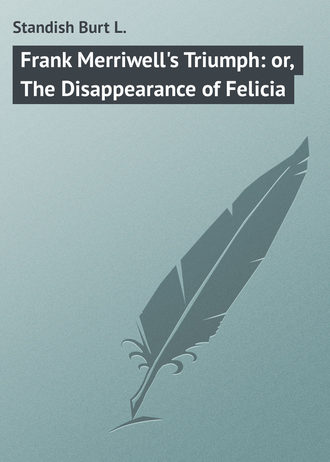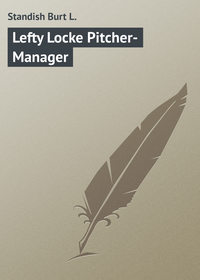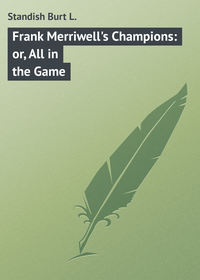 полная версия
полная версияFrank Merriwell's Triumph: or, The Disappearance of Felicia
Frank laughed in the man’s face.
“It’s plain,” he said, “that even now, Macklyn Morgan, you don’t understand me. It’s plain that you still fancy it possible to frighten me. You are wasting your time, sir. Go ahead with your siege and see what comes of it.”
This seemed to enrage Morgan, for suddenly he violently shook the flag at Frank and cried:
“Then take the result of your obstinacy!”
Instantly there were several puffs of white smoke from beyond the distant rocks and Frank pitched forward upon his face.
At the same moment Macklyn Morgan made a spring and dropped behind a little pile of bowlders, where he was fully protected from the defenders of the valley.
Apparently Frank had been treacherously shot down in cold blood while under the flag of truce.
The watchers of the defense were horrified as they saw Frank fall. Dick uttered a savage cry and would have rushed out from behind the rocks had he not been seized by Brad Buckhart.
“Steady, pard – steady!” warned the Texan, finding it difficult to detain young Merriwell.
“Let go!” panted Dick. “Don’t you see! My brother! The dastardly wretches have shot him!”
“And do you propose to prance out there and let them shoot you up, too? Do you propose to let these measly galoots wipe out the Merriwell family in a bunch? Cool down, pard, and have some sense.”
Bart Hodge had been no less excited than Dick, and nothing could have prevented him from rushing forth to Frank had he not suddenly made a discovery as he sprang up. His eyes were on his chum of school and college days, and he saw Frank quickly roll over and over until he lay close against a bowlder, where he would be protected in case the enemy fired again. Then, as he lay thus, Merry lifted the hand that still clutched the white handkerchief and waved it in a signal to his friends.
Hodge was shaking in every limb.
“He is not killed!” he exclaimed.
“Heap keep still,” came from old Joe. “No shot at all. Him all right. Him see gun flash, him drop quick, bullets go over um. Him fool bad palefaces a heap.”
“What’s that?” fluttered Dick. “Do you mean that he wasn’t hurt, Joe?”
“No hurt him much,” asserted the old savage, “Strong Heart he have keen eye. He watch all the time. He see gun flash. He see smoke. He drop quick.”
It was not easy to make Dick believe his brother had not been hurt, but Frank managed to convey to them by signals that he was all right. Their relief was unbounded. Indeed, Dick’s eyes filled with a mist of joy, although his anxiety was intense, for he feared that his brother might still be in a position where the enemy could get further shots at him. Frank, however, hugged the rocks closely, and there was no more shooting.
On the other side of the bowlders lay Macklyn Morgan, his evil heart filled with triumph, for he believed Merriwell had been slain. His astonishment was unbounded when he heard Frank’s voice calling his name.
“Morgan,” called Merry, “can you hear me?”
“Yes, I hear you,” answered the astounded villain. “So they didn’t kill you outright, did they?”
“Hardly that,” returned Merry. “They didn’t even touch me.”
“What did you say?” burst from Morgan. “Why, those men were the best shots in our party! They were carefully chosen for this piece of business.”
“A fine piece of business, Macklyn Morgan!” contemptuously retorted Merry. “And you planned it, I presume! You are a smooth-faced, hypocritical man of wealth, known far and wide and greatly respected because of your riches. Yet you have descended to a piece of business like this! Sukes was bad enough, Morgan; but you’re a hundred times worse. You have failed in your most dastardly plot, just as you will fail in everything. Lie still, Macklyn Morgan. Keep close to those rocks where you are, for if you show yourself you will be riddled by my watching friends. From this time on your life will not be worth a pinch of snuff if they get a chance at you.”
So the two men, the fearless youth and the treacherous money king, lay each sheltered by the bowlders while the sun sank in the west and day slipped softly into night. When the shadows had deepened sufficiently, Frank crept away on his stomach toward the valley, taking the utmost pains not to expose himself, and, through his skill in this, returned at last in safety to his friends, who welcomed him joyously.
“Heap well done!” grunted old Joe. “But now Strong Heart him know more than to trust um bad men. No do it some more.”
Dick was able to repress his emotion, although Frank read in the few words his brother said the intense anxiety he had felt.
“What will be their next move?” exclaimed Hodge.
“They will attempt to overpower us by some sudden move to-night,” said Frank. “We must remain on the alert every moment.”
The stars came out bright and clear, as they always do in that Southwestern land, and, if possible, their light seemed more brilliant than usual. The night advanced, and still the enemy before them remained silent. It was Curry who discovered something down in the valley that attracted his attention and interested him. He called the attention of Frank, who saw down there a light waving to and fro and then in circles.
“Whatever does yer make of that, pard Merriwell?” asked Curry.
“It’s a signal,” said Frank – “a signal from Abe and Felicia. They are seeking to attract our attention. I must go down there at once.”
“There’s trouble of some sort down there, Frank,” said Dick, who had reached his brother’s side. “Let’s go quickly.”
Merry found Bart and directed him to take charge of the defense at that point and be constantly on the alert. With Dick close behind him, he hastened down the fissure leading into the valley. In the narrow place through which they descended the starlight was dim and uncertain, yet they hastened with reckless speed. Reaching the valley, they made straight for the cabin, where the signal light was still waving. As they drew near, they saw the grotesque figure of little Abe swinging a lighted torch over his head and then waving it round and round. The flaring torch revealed Felicia, who stood near.
“What’s the matter, Abe?” demanded Frank, as he dashed up.
“I am glad you saw it! I am glad you came!” said the boy. “Frank, those men are trying to get into the valley another way.”
“Where? How?”
“Felicia saw them first. Some of them are on the other side.”
“But there is no entrance save the one we are defending.”
“They are planning to get in by descending the face of the precipice. We saw them creep down over the rocks, three or four of them, and it took them a long time. They have reached a precipice that is perpendicular.”
“That should stop them.”
“I watched them through your field glasses, which I found in the cabin. They were letting themselves down with the aid of ropes.”
“Ropes?” exclaimed Dick.
“A new game,” said Frank.
“Can they descend that way?” questioned the boy.
“It’s possible,” admitted Frank. “Show us where they are, Abe. Drop that torch and lose not a moment.”
The hunchback led the way, running on before them, and they followed him closely. As they came at length to the vicinity of the precipice, they saw through the pale starlight that Abe had spoken truly, for already long lariats had been spliced together, and, by the aid of these, which now dangled from the top of the precipice to the bottom, one of the men had already begun to descend. They saw the shadowy figure of his companions waiting above, and it seemed that the men did not dare trust themselves more than one at a time upon the spliced rope.
“We’ve got to stop that, Frank!” panted Dick.
“We will stop it,” said Merry. “Don’t attract attention. Let’s get nearer.”
They stole forward still nearer, watching the man as he came down slowly and carefully. This man had descended almost half the distance when a sudden rifle shot broke the stillness of the valley. Immediately, with a cry, the dark form of a man dropped like a stone.
Frank and his companions had been startled by the shot, but Merry instantly recognized the peculiar spang of the rifle.
“Old Joe!” whispered Merry.
As they stood there a silent figure came slipping toward them, and the old Indian stopped close at hand.
“Bad men no come down that way,” he said quietly. “Joe him shoot pretty good – pretty good. Joe him think mebbe he shoot four, five, six times, he might cut rope. Joe him shoot once, him cut rope. Joe him got rheumatism. Him pretty old, but him shoot pretty good.”
“Was that what you fired at?” asked Merry, in astonishment. “You didn’t shoot at the man on the rope?”
“Plenty time to shoot man when Joe him find out he no cut rope,” was the retort. “When rope him cut one man he come down pretty fast. Him strike, bump! Mebbe it jar him some.”
“The fall must have killed him instantly,” said Frank. “If you cut that rope, Joe, you have spoiled their attack on this side of the valley. Stay here. Watch sharp, and make sure they don’t resume the attempt. If they do, Abe can signal again.”
“All right,” said Crowfoot. “Me watch.”
With this assurance, Frank felt safe to return again to the defenders above, and Dick returned with him. When he told what had taken place in the valley Cap’n Wiley observed:
“I had it in for Joseph Crowfoot, Esquire, for calling me Wind-in-the-head; but I will overlook the insult. Evidently the old boy is a whole army in himself.”
As they lay waiting for the attack they fully expected must take place, there came to their ears from the direction in which the enemy was supposed to be the sounds of shots, followed immediately by hoarse yelling and more shooting.
“Well, what do you make of that, Merry?” cried Hodge. “There seems to be a ruction of some sort going on over there.”
Frank listened a few moments. The sound of the shooting receded, and the yelling seemed dying out in the distance.
“It may be a trick,” he said; “but I am in hopes those ruffians have quarreled among themselves. If it is a trick, we will keep still and wait. Time will tell what has happened.”
Time did tell, but all through the rest of the night they waited in vain for the attack. When morning finally dawned the mountains lay silent in the flood of light which poured from the rising sun. Nowhere was the enemy to be discovered.
Old Joe came up to them from the valley and declared that the men on the other side had been driven away. The fate of their comrade seemed to dishearten them, and they had crept back like snails over the rocks and vanished during the night.
It was the old Indian who set out to find what had happened among the besiegers led by Morgan. He slipped away among the rocks and brush and vanished like a phantom. He was gone an hour or more when he suddenly reappeared and beckoned to them.
“Come see,” he invited.
They knew it was safe to follow him, and they did so. Where the enemy had been ensconced they found one man, sorely wounded and in a critical condition. That was all. The others, to the last rascal of them, had vanished.
“Where have they gone, Joe?” exclaimed Frank.
“Ask him,” directed the Indian, motioning toward the wounded man. “Mebbe he tell.”
This man was questioned, and the story he told surprised and satisfied the defenders beyond measure. Disgusted over their failure to get into the valley, the ruffians had plotted among themselves. A number of them had devised a plan which to them seemed likely to be profitable. Knowing Macklyn Morgan was a very rich man, they had schemed to take him personally, carry him off, and hold him in captivity until he should pay them handsomely for his freedom. Not all the ruffians had been taken into this plot, and when the schemers started to carry Morgan off there was an outbreak and some shooting, but they got away successfully.
With Morgan and the leading spirits of the affair gone, the others quickly decided to give up the assault on the valley, and that was why they had departed in the night, leaving the wounded man behind to such mercy as Merriwell and his friends might show.
“Well, what do you think of that?” exclaimed Dick.
“Think?” said Frank, with a laugh. “Why, I think Macklyn Morgan has been caught in his own trap. Now let him get out of it!”
CHAPTER XXIII.
NEW RICHES PROMISED
When a week had passed Frank and his friends began to feel that all their troubles were over, for the time being, at least. Old Joe Crowfoot, who had been scouting in the vicinity, reported that he found no signs of probable marauders and himself settled down contentedly to smoke and loaf in the warm sunshine of the valley. With Dick and Felicia near, where he could watch them occasionally or hear their voices, the peaceful happiness of the old fellow seemed complete.
Cap’n Wiley likewise loafed to his heart’s content And if ever a person could make a whole-souled and hearty success of loafing it was the cap’n. He became so friendly with Crowfoot that old Joe even permitted him sometimes to smoke his pipe.
One beautiful morning the entire party was gathered in front of Merriwell’s cabin talking things over.
“There seems nothing now, Frank, to prevent us from securing miners and opening up this new claim,” said Hodge. “Macklyn Morgan seems to have disappeared off the face of the earth.”
“Perhaps he has learned that it is dangerous for a man like him to attempt dealing with the ruffians of this part of the country,” put in Dick. “It seems certain now that he was actually carried into captivity by the very gang he employed to seize these mines.”
“But he will get free all right,” declared Frank. “He will turn up again sometime.”
“If they don’t kill him any,” said Buckhart.
“They won’t do that,” asserted Merriwell. “They can make nothing out of him in that fashion; but they might make a good thing by forcing him to pay a large sum for his liberty.”
“Well, now that everything seems all right here, Frank,” said Dick, “I suppose Brad and I will have to light out for the East and old Fardale.”
“Waugh! That certain is right!” exclaimed the Texan. “We must be on hand, pard, when Fardale gets into gear for baseball this spring.”
“Baseball!” cried Wiley, giving a great start. “Why, that word thrills my palpitating bosom. Baseball! Why, I will be in great shape for the game this season! My arm is like iron. Never had such a fine arm on me before. Speed! Why, I will put ’um over the plate like peas! Curves! Why, my curves will paralyze ’um this year!”
“Ugh!” grunted old Joe. “Wind-in-the-head blow a heap. Him talk a lot with him jaw. Mebbe him jaw git tired sometime.”
“Look here, Joseph,” expostulated Wiley, “I don’t like sarcasm. If I didn’t love you as a brother, I might resent it.”
“Great horn spoon!” cried Buckhart, scratching vigorously. “These fleas are the biggest and worst I ever saw. You hear me murmur!”
“What, these?” squealed Wiley, in derision. “Why, these little creatures are nothing at all – nothing at all. They just tickle a fellow up a bit. Fleas! Say, mates, you should have seen the fleas I have beheld in my tempestuous career. You should have seen the fleas I met up with in the heart of darkest Africa. Those were the real thing. Don’t ’spose I ever told you about those fleas?”
And he told them a long and wonderful story about African fleas.
“Ugh!” grunted the old Indian, when Wiley had finished. “Wind-in-the-head biggest blame liar old Joe ebber see.”
Some days later, with the exception of Hodge and Crowfoot, Frank and the rest of his party arrived in Prescott. Hodge and the aged redskin were left, together with one of Pete Curry’s men, to guard the valley after a fashion. Besides going to Prescott for the purpose of seeing his brother and Buckhart off, Frank had several other objects in view. With him he brought considerable ore, taken from the quartz vein they had located in the valley, and also a small leather pouch that was nearly filled with dull yellow grains and particles washed from the placer mine. With these specimens Frank proceeded direct to an assayer, who was instructed to make an assay and give a report.
Following this, Frank set about picking up some genuine miners who knew their business and who could be relied on. It was his purpose to keep a few men at work on the claims while he completed the plans talked over by himself and Hodge and arrange for the transportation to the valley of such machinery as they needed to work the mines. As far as the placer was concerned, this was not such a difficult problem. With the quartz mine, however, it was quite a serious matter, as the valley was far from any railroad and extremely difficult of access.
Frank knew very well that it would cost a big sum of money to begin practical operations on the quartz claim, and already, for a young man of his years, he had his hands pretty full. Hodge, however, had been enthusiastic, and Merry felt that Bart would, with the greatest readiness and satisfaction, remain where he could oversee everything and carry all plans out successfully.
Merry felt that he was greatly indebted to Wiley, and he saw that the sailor had one of the best rooms in the best hotel of Prescott and was provided with every comfort the house could afford. This was not the only way in which Frank intended to reward the captain.
Wiley himself was somewhat “sore” because he had declined to accompany Frank and Bart at the time they had returned to the valley and successfully located Benson Clark’s lost mines.
“’Tis ever thus,” he sighed wearily, when the matter was spoken of. “I will bet eleventeen thousand dollars that I have lost more than a barrel of good opportunities to become rotten with wealth during my sinuous career. Not that I haven’t felt the salubrious touch of real money to an extensive extent, for sometimes I have been so loaded down with it that it rattled out of my clothes every step I took. When I sauntered carelessly along the street in days past I have shed doubloons, and picaroons, and silver shekels at every step, and I have often been followed by a tumultuous throng, who fought among themselves over the coin that rained from my radiant person. Still to-day here I am broke, busted, while the world jogs on just the same, and nobody seems to care a ripityrap. Excuse these few lamentations and wails of woe. By and by I will take a little medicine for my nerves and feel a great deal better.”
“Don’t worry over it, Wiley,” said Frank, laughing. “It will all come out in the wash. I don’t think you will die in the poorhouse.”
“Not on your tintype!” cried the sailor. “I propose to shuffle off this mortal coil in a palace.”
“Wiley,” cried Frank, “I believe you would joke in the face of old Death himself!”
“Why not? I regard life as a joke, and I don’t propose to show the white feather when my time comes. I will have no mourning at my funeral. I propose to have my funeral the gayest one on record. Everybody shall dress in their best, and the band shall play quicksteps and ragtime on the way to the silent tomb. And then I shall warn them in advance to be careful, if they want to finish the job, not to pass a baseball ground where a game is going on, for just as sure as such a thing happened I’ll kick off the lid, rise up, and prance out onto the diamond and git into the game.”
“Don’t you worry about what will become of you, cap’n,” advised Merry. “For all that you failed to stick by us in relocating those claims, I fancy we shall be able to make some provisions for you.”
“That’s charity!” shouted Wiley. “I will have none of it! I want you to understand that little Walter is well able to hustle for himself and reap his daily bread. Not even my best friend can make me a pauper by giving me alms.”
“Oh, all right, my obstinate young tar,” smiled Merry. “Have your own way. Go your own course.”
“Of course, of course,” nodded Wiley. “I always have, and I always will. Now leave me to my brooding thoughts, and I will evolve some sort of a scheme to make a few million dollars before sundown.”
Wiley’s schemes, however, did not seem to pan out, although his brain was full of them, and he had a new one every day, and sometimes a new one every hour of the day. Knowing they were soon to be separated again, Dick and Felicia spent much of their time together. It was Merriwell’s plan, of which he had spoken, to take Felicia to Denver and find her a home there where she could attend school.
The assay of the quartz Merry had brought to Prescott showed that the mine was marvelously rich. Beyond question it would prove a good thing, for all of the great expense that must be entailed in working it. On the day following the report of the assayer, Merry was writing letters in the little room of the hotel provided for such use when a man entered, approached him, and addressed him.
“Excuse me,” said this man, who was middle-aged and looked like a business man from the ground up. “I suppose you are Mr. Frank Merriwell?”
“That’s my name.”
“Well, my name is Kensington – Thomas Kensington. Perhaps you have not heard of me?”
“On the contrary, I have heard of you, Mr. Kensington. I believe you have a mine in this vicinity?”
“Yes, and another in Colorado. I hear that you have lately located a promising quartz claim. I understand that the assay indicates it is a valuable find.”
“Perhaps that’s right,” admitted Merry; “but I am at a loss just how you acquired the information.”
“My eyes and ears are open for such things. I am in Prescott to have a little assaying done myself, and I happened, by the merest chance, to hear Mr. Given, the assayist, speaking with an assistant about the result of his investigation of your specimens. You understand that it was barely a chance.”
“I presume so,” said Merry. “I don’t suppose that Given would talk of such matters publicly.”
“And he did not, sir – he did not. I assure you of that. I have also learned, Mr. Merriwell, that you have other mines?”
“Yes, sir.”
“And this new claim of yours is inconveniently located at a distance from any railway town?”
“That is correct.”
“Now, I am a man of business, Mr. Merriwell, and if you care to have me do so, I would like to investigate your property with the possibility of purchasing this new mine of yours.”
Frank was somewhat surprised.
“I am not at all certain, Mr. Kensington, that I wish to sell. Besides that, I have a partner who would have to be consulted in the matter.”
“But we might talk it over, sir – we might talk it over. Are you willing to do so?”
“I have no objections to that.”
Kensington then drew up a chair and sat down close by the desk at which Merry had been writing.
“If I were to make you an offer for your property, on being satisfied with it as something I want,” he said, “would you consider it?”
“It’s not impossible. But you must remember that my partner is to be consulted in the matter.”
“Of course, of course.”
“He might not care to sell. In that case I can do nothing.”
“You might use your influence.”
Frank shook his head.
“I wouldn’t think of that, sir. I would leave the question entirely to Hodge, and he could do as he pleased.”
“Do you fancy that there is a possibility that he might be induced to sell in case the offer seemed an advantageous one?”
“Yes, I think it possible.”
“Good!” nodded Kensington. “That being the case, we can discuss the matter further. Do you mind showing me the report of the assayer?”
“Not at all. Here it is.”
Merry took the paper from his pocket and handed it to Kensington, who glanced over the figures and statements, lifted his eyebrows slightly, puckered his lips, and whistled softly.
“Do you mean to tell me, Mr. Merriwell, that this assay was made from an average lot of quartz from your mine, or was it from specially chosen specimens?”
“Mr. Kensington, I had this assay made for myself, and not for the public. I had it made in order that I might find out just how valuable the mine is. That being the case, you can understand that I would not be foolish enough to pick what appeared to be the richest ore. On the contrary, sir, I took it as it came.”
Again Kensington whistled softly, his eyes once more surveying the figures.
“How far is this mine from the nearest railroad point?”
“Just about one hundred miles.”
“And in a difficult country as to access?”
“Decidedly so,” was Merry’s frank answer.









